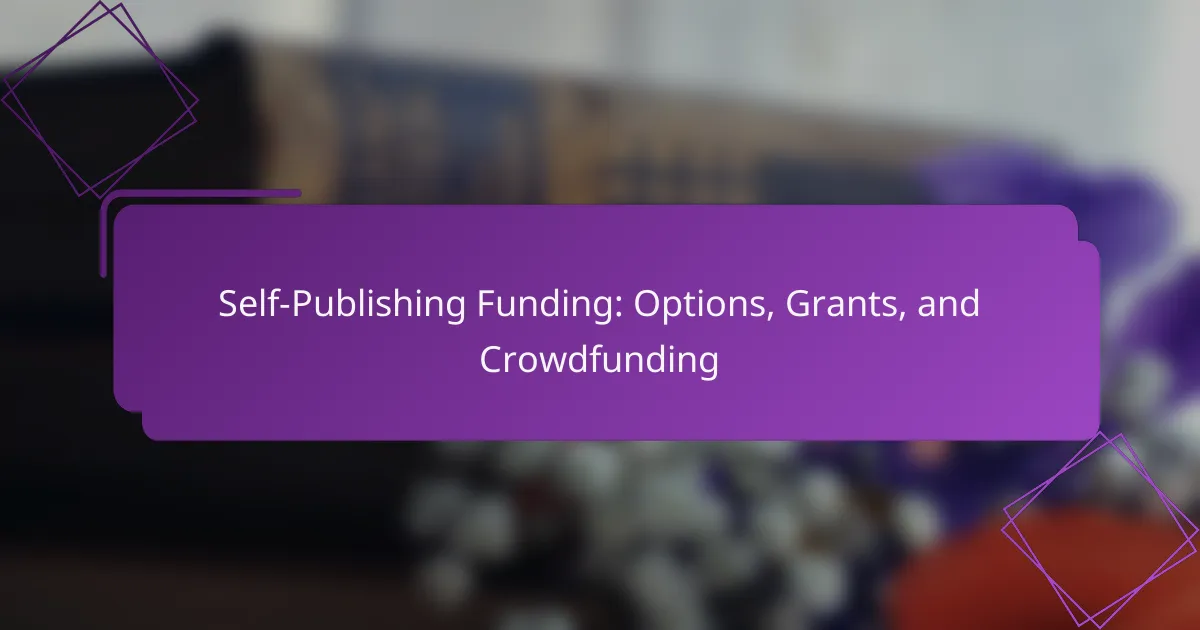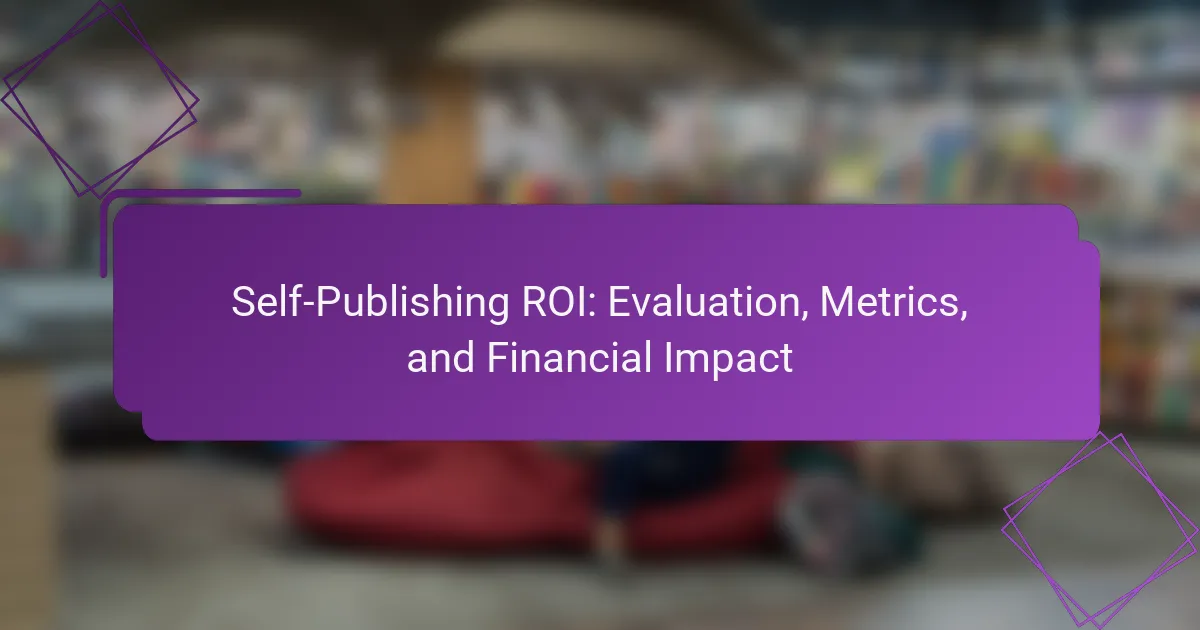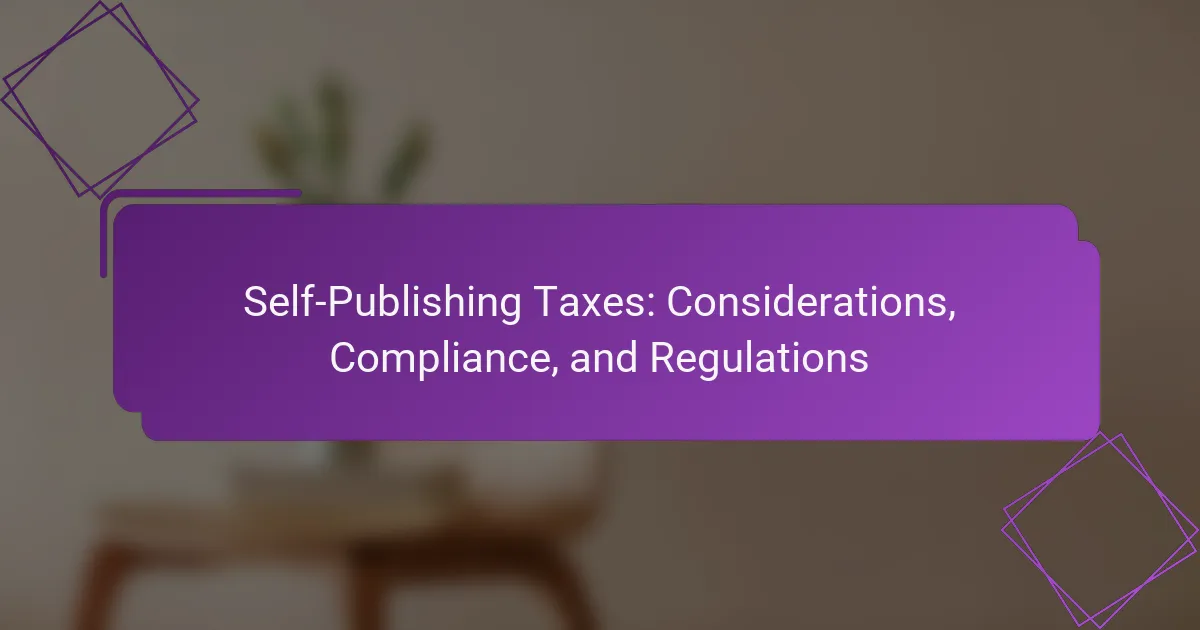Self-publishing authors can explore various funding options, including personal savings, loans, and grants, to finance their projects effectively. Grants offer non-repayable financial support for essential costs like editing and marketing, while crowdfunding platforms enable authors to connect directly with potential readers and raise funds for their work. Evaluating these options can help writers align their financial strategies with their publishing goals.
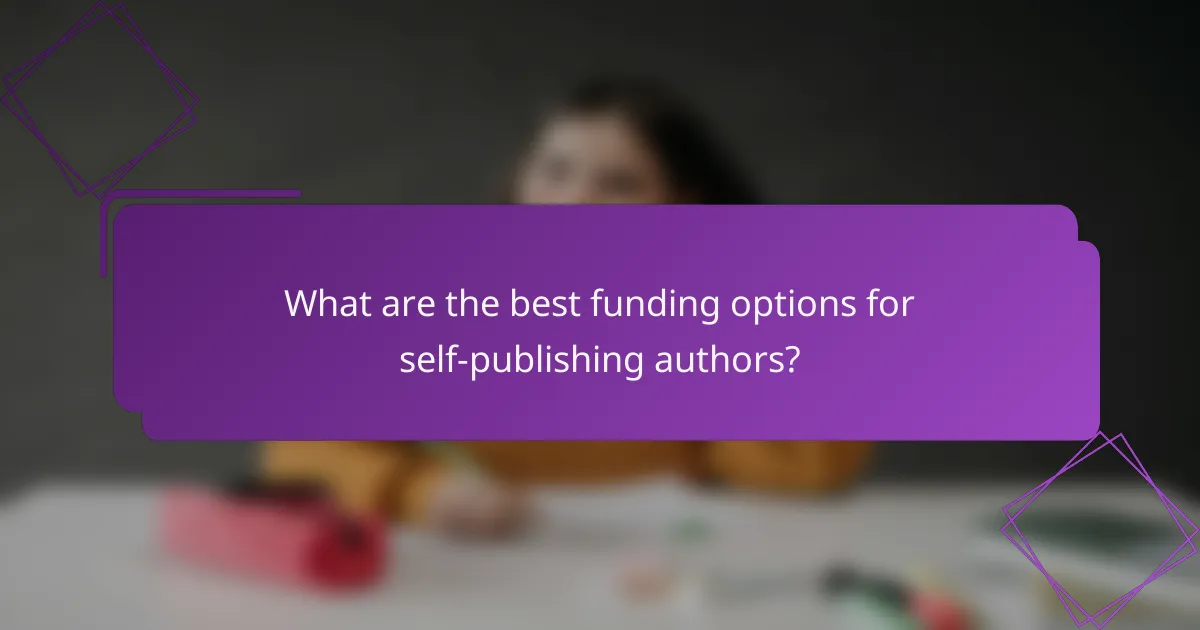
What are the best funding options for self-publishing authors?
Self-publishing authors have several funding options available to finance their projects, including personal savings, loans, and support from family or friends. Each option has its advantages and disadvantages, so it’s essential to evaluate which method aligns best with your financial situation and publishing goals.
Personal savings
Using personal savings is often the most straightforward way to fund self-publishing. This method allows you to maintain complete control over your project without incurring debt. However, it’s crucial to ensure that you have enough savings set aside for both publishing and living expenses.
Consider setting a budget for your self-publishing costs, which may include editing, cover design, formatting, and marketing. Aim to allocate a specific amount from your savings to cover these expenses without jeopardizing your financial security.
Bank loans
Bank loans can provide a substantial amount of funding for self-publishing, but they come with the obligation of repayment with interest. To secure a loan, you typically need a solid business plan that outlines your publishing goals and projected earnings.
Be aware of the interest rates and repayment terms, as these can vary significantly. It’s advisable to compare offers from different banks to find the most favorable conditions before committing to a loan.
Credit cards
Credit cards can be a quick source of funding for self-publishing, especially for smaller expenses. They offer flexibility in payments, but high-interest rates can lead to significant debt if not managed carefully.
Use credit cards for immediate costs like cover design or marketing, but avoid relying on them for large sums. Aim to pay off the balance each month to minimize interest charges and maintain a healthy credit score.
Family and friends
Seeking financial support from family and friends can be a viable option for self-publishing. This approach often comes with lower pressure and flexible repayment terms compared to traditional loans.
When asking for support, be clear about your project and how their investment will help. Consider drafting a simple agreement outlining the terms of repayment to avoid misunderstandings later on.
Self-publishing platforms
Many self-publishing platforms offer funding options or services that can help authors finance their projects. For instance, platforms like Kickstarter or Indiegogo allow authors to raise funds through crowdfunding campaigns.
When using these platforms, create a compelling pitch that outlines your project and its benefits to potential backers. Set realistic funding goals and consider offering rewards to incentivize contributions, such as signed copies or exclusive content.
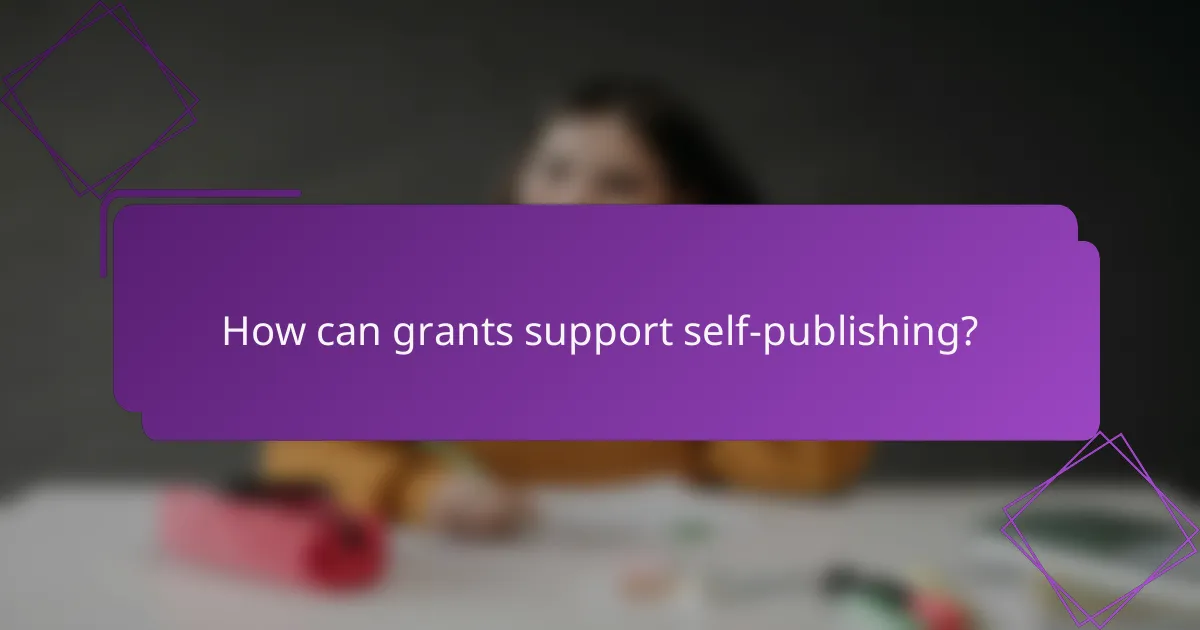
How can grants support self-publishing?
Grants can provide essential financial support for self-publishing authors, enabling them to cover costs such as editing, design, and marketing. By applying for various grants, writers can access funds that do not require repayment, making it a viable option for those looking to publish independently.
National Endowment for the Arts grants
The National Endowment for the Arts (NEA) offers grants specifically aimed at supporting individual artists, including writers. These grants can help fund projects that contribute to the arts and culture, with awards typically ranging from a few thousand to tens of thousands of dollars.
To apply, authors must submit a detailed proposal outlining their project, budget, and expected outcomes. It’s crucial to demonstrate how the work aligns with NEA’s mission to promote artistic excellence and accessibility.
Local arts council funding
Local arts councils often provide funding opportunities for writers within their communities. These grants can vary significantly in amount and eligibility criteria, but they typically focus on projects that enhance local culture and engage the community.
Writers should check their local arts council’s website for specific application guidelines and deadlines. Networking with local artists and attending council meetings can also provide insights into available funding and best practices for proposals.
Writing fellowships
Writing fellowships offer financial support and resources to authors, allowing them to focus on their craft without the burden of financial stress. These fellowships may include stipends, workspace, or access to mentorship, and can last from a few months to a year.
Many fellowships are competitive, requiring a strong portfolio and a clear project proposal. Writers should research various fellowships, such as those offered by universities or literary organizations, to find the best fit for their work and goals.
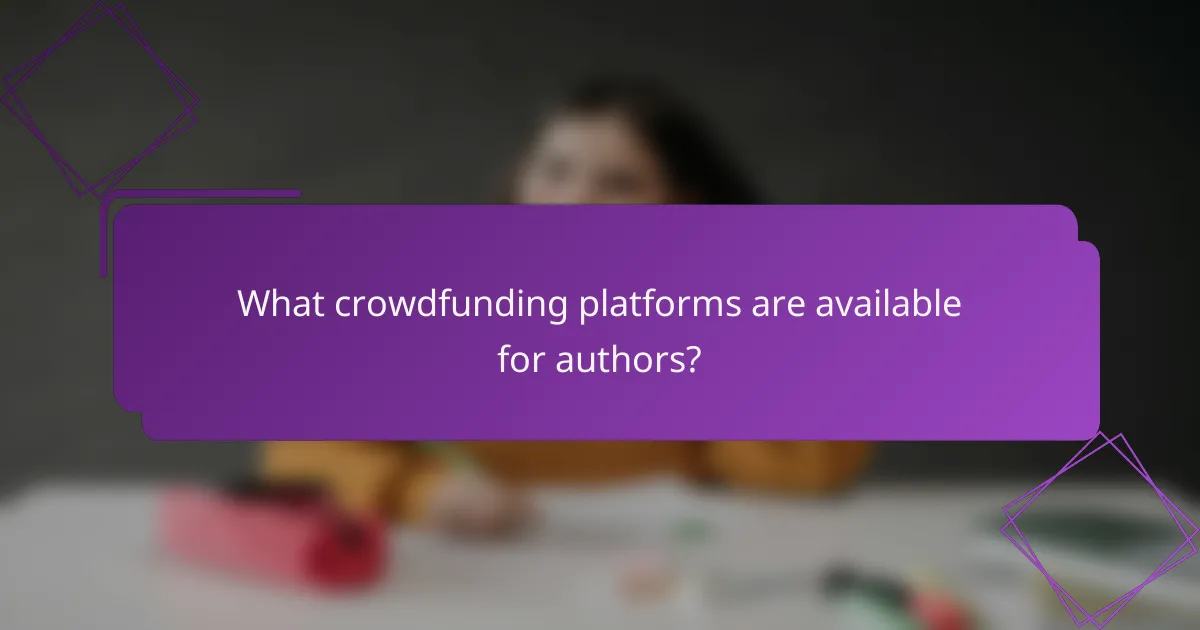
What crowdfunding platforms are available for authors?
Authors have several crowdfunding platforms to choose from, each offering unique features and benefits. These platforms allow writers to raise funds for their projects by engaging with potential readers and supporters directly.
Kickstarter
Kickstarter is a popular crowdfunding platform specifically designed for creative projects, including books. Authors can set a funding goal and a deadline, and if they reach their goal within that timeframe, they receive the funds. If not, no money is collected from backers.
When using Kickstarter, it’s essential to create an engaging campaign page that includes a compelling video, detailed project description, and attractive rewards for backers. Successful campaigns often feature funding goals in the low thousands of dollars, depending on the project’s scope.
Indiegogo
Indiegogo offers more flexibility than Kickstarter, allowing authors to choose between fixed and flexible funding options. With fixed funding, authors must meet their goal to receive any funds, while flexible funding allows them to keep whatever amount they raise, even if they don’t meet their goal.
This platform is suitable for authors looking to fund various types of projects, from self-publishing to marketing campaigns. Indiegogo campaigns can vary widely in funding goals, often ranging from a few hundred to several thousand dollars, depending on the project’s needs.
GoFundMe
GoFundMe is primarily known for personal fundraising but can also be used by authors seeking support for their writing projects. Unlike Kickstarter and Indiegogo, GoFundMe does not have a funding deadline, allowing authors to raise funds at their own pace.
While GoFundMe is less focused on creative projects, it can be effective for authors who have a personal story or cause related to their writing. Authors should consider sharing their journey and connecting emotionally with potential supporters to increase their chances of success.
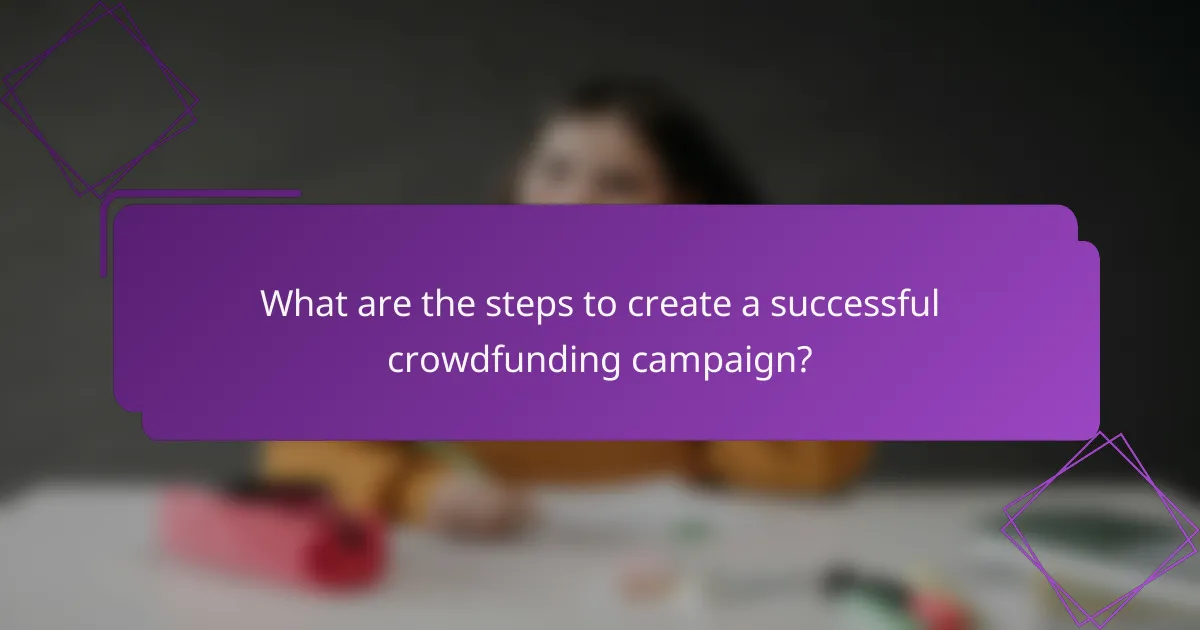
What are the steps to create a successful crowdfunding campaign?
Creating a successful crowdfunding campaign involves careful planning, engaging content, and effective promotion. By following a structured approach, you can maximize your chances of reaching your funding goal.
Define your funding goal
Your funding goal should be a clear, specific amount that reflects the total costs of your project. Consider all expenses, including production, marketing, and shipping, to avoid underfunding. A common range for many projects is between $5,000 and $50,000, depending on the scope.
Be realistic about what you can achieve within your timeline and resources. Setting a goal that is too high may deter potential backers, while a goal that is too low might not cover your needs.
Create engaging content
Engaging content is crucial for attracting backers to your campaign. Start with a compelling story that connects emotionally with potential supporters. Use high-quality images and videos to showcase your project and explain why it matters.
Consider offering rewards that appeal to different funding levels. For example, a small donation might earn a thank-you note, while larger contributions could receive exclusive merchandise or experiences related to your project.
Promote your campaign
Promotion is key to driving traffic to your crowdfunding campaign. Utilize social media platforms, email newsletters, and community forums to spread the word. Engaging with your audience through updates and personal messages can also help maintain interest.
Collaborate with influencers or bloggers who align with your project to reach a wider audience. Consider setting aside a budget for paid advertising to boost visibility, especially in the initial days of your campaign when momentum is critical.
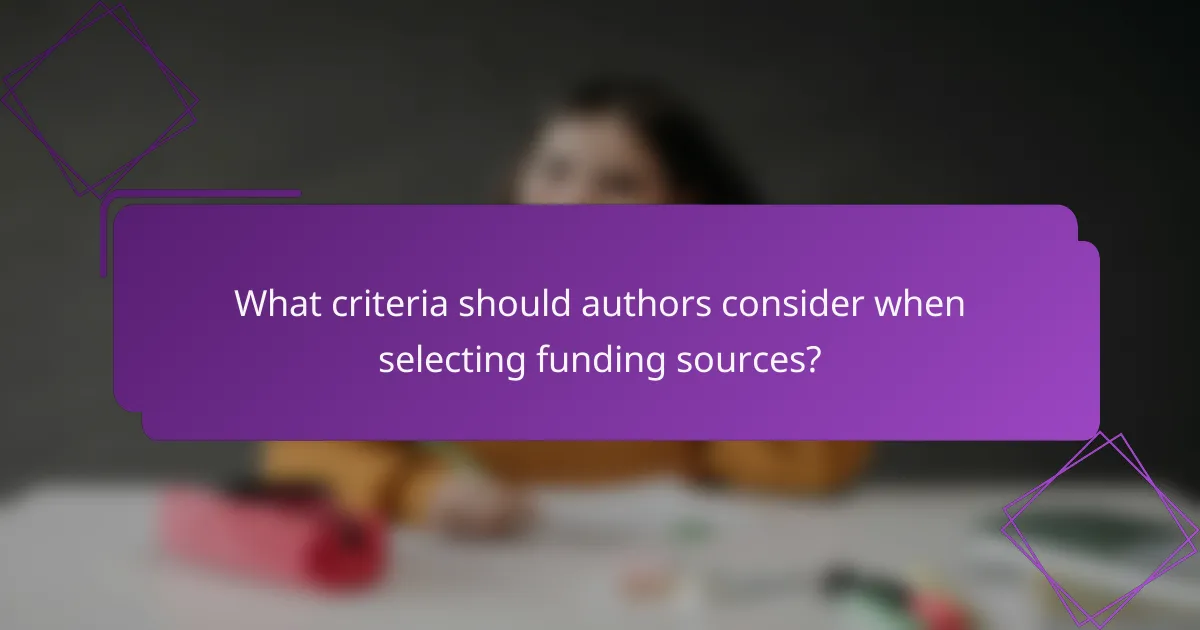
What criteria should authors consider when selecting funding sources?
Authors should evaluate funding sources based on their goals, the amount of funding needed, and the conditions attached to each option. Consider factors such as repayment terms, ownership rights, and the level of creative control retained.
Types of funding sources available
Funding sources for self-publishing can be broadly categorized into grants, loans, and crowdfunding. Grants typically do not require repayment but may have specific eligibility criteria and application processes. Loans provide immediate cash but require repayment with interest, while crowdfunding allows authors to raise money directly from supporters, often in exchange for rewards or pre-orders.
Evaluating grant opportunities
When considering grants, authors should research organizations that support literary projects, such as arts councils or nonprofit foundations. Each grant may have unique requirements, such as project proposals or deadlines, so thorough preparation is essential. Additionally, many grants are competitive, so highlighting the project’s originality and potential impact can improve chances of success.
Crowdfunding strategies
Crowdfunding can be an effective way to finance a self-publishing project by engaging potential readers early. Platforms like Kickstarter or Indiegogo allow authors to set funding goals and offer incentives to backers. Successful campaigns often include a compelling pitch video, clear project descriptions, and attractive reward tiers that resonate with the target audience.
Common pitfalls to avoid
Authors should be cautious of overestimating funding needs, as this can lead to unrealistic goals and disappointment. It’s also important to read the fine print of any loan or grant agreement to avoid hidden fees or obligations. Lastly, failing to promote a crowdfunding campaign adequately can result in underwhelming support, so a solid marketing plan is crucial.
